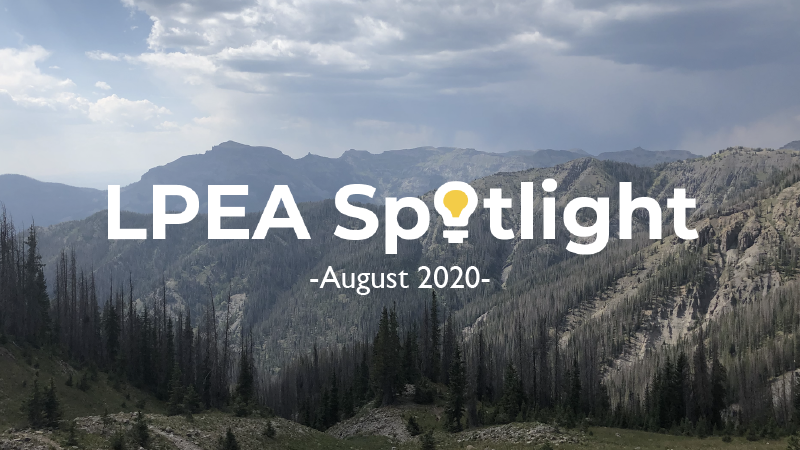This blog series covers the monthly La Plata Electric Association (LPEA) Board of Directors meetings. We’re tracking the board for transparency and accountability, as well as to stay current on their renewable energy initiatives. Find past and future spotlights here.
Get LPEA Spotlight in your inbox!
[button color=”extra-color-1″ hover_text_color_override=”#fff” size=”large” url=”#connect_open” text=”SUBSCRIBE” color_override=”#a1d078″]
PUC Decision Delayed
In July, the administrative law judge at the Colorado Public Utilities Commission (PUC) ruled that Tri-State had been unjust, unreasonable, and discriminatory by not providing LPEA and United Power with exit fees- great news for LPEA as it tries to navigate its own energy future.
Since then, parties to the case (United, LPEA, and Tri-State) have filed exceptions, and the PUC has delayed their decision deadline to November 5th. This delay was just to give the PUC extra time to study all the exceptions and make sure that they were ready to issue their final ruling.
FERC Throws a Curveball
But then, at the end of the month, the Federal Energy Regulatory Commission (FERC) issued a ruling that might change things.
Remember, Tri-State has been pursuing full federal regulation for over a year. While FERC has decided Tri-State is under its jurisdiction, previously the FERC had also decided that it and the PUC had concurrent jurisdiction over exit fees. But now, their new ruling holds that FERC has exclusive jurisdiction and concludes “the Colorado PUC’s jurisdiction over the complaints regarding Tri-State’s exit charges is preempted.” (FERC PDF)
At its face, this looks like terrible news for co-ops like LPEA. LPEA has already spent huge amounts of time, money, and effort at the Colorado PUC on this exit case. FERC also has not even decided on an exit fee methodology, something that could get tied up for much longer than this November 5th PUC deadline. Plus, disputes at FERC are much more expensive, take longer, and are much farther away than dealing with things right at the PUC. FERC regulation puts co-ops looking for an exit at a severe disadvantage- just like Tri-State wants.
Still Hope for State Regulation
There is, however, one last way to have things heard at the PUC.
You might remember that Tri-State qualified for FERC regulation in the first place by adding a non-cooperative member, MIECO. And in their Friday ruling, FERC specifically gives regulatory authority to the PUC on whether or not adding MIECO was legal in the first place, noting that, “any future Colorado PUC and state court rulings regarding the validity of Mieco’s membership in Tri-State could be relevant [to FERC jurisdiction]”.
And, there’s a good chance that MIECO’s addition was illegal.
In United Power’s exception filed in July, they ask the PUC to declare that, “Tri-State’s purported addition in 2019 of the non-utility members was unlawful, improper, without effect, and void, meaning that the non-utility members are not now, and never have been, lawful Tri-State members.”
United also notes in the same filing that, “LPEA and United Power contended that because the non-utility members had not been added in compliance with Colorado law, they had not become “owners” of Tri-State, so Tri-State remained owned by its prior members and exempt from FERC rate regulation.”
Similarly, United Power and LPEA’s expert testimonies, offered through testimony and memorandum, conclude that the addition of noncooperative members to Tri-State was improper because there are no uniform conditions of membership in the bylaws. The testimony also contends that the it’s impermissible because Tri-State’s Board never voted on the new members and then Tri-State didn’t even change its bylaw requirements so that all members can meet all bylaw requirements. Finally, Tri-State amended the bylaws for an unlawful purpose, which makes the additional members illegal. Tri-State themselves have said that they wanted the new members to be exempt from PUC regulation, which is not a proper purpose for amending the bylaws.
At the end of the day, the expert witnesses found that Tri-State’s acquisition of new members was improper and unlawful. And if the PUC finds the same thing, and forces the noncooperative members out of the Tri-State “family”, then Tri-State is no longer FERC regulated and jurisdiction falls squarely back in their court.
Want to get involved? You can send comments to the PUC asking them to grant the United Power exception and rule on whether Tri-State’s surprise move to add non-utility members was legal under Colorado law, and whether it was in Coloradoan’s best interests. This is a great time to have your voice be heard so that Colorado issues stay right here in Colorado!
Comments can be entered at this link: http://www.dora.state.co.us/pls/real/CCTS_oWEB.comment_form
Be sure to enter the docket number: 19F-0620E.
UPCOMING MEETINGS:
Next LPEA Meetings:
September Board Meeting: Wednesday September 16th via Zoom. Details on LPEA website.
Call or email your LPEA Board Directors.
(Hover over your neighborhood for contact information!)



